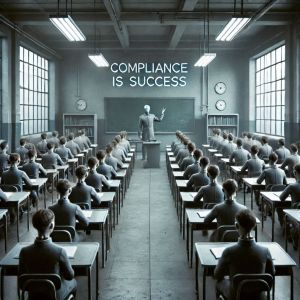Clones
The Clone Factory: Education, Compliance, and the Illusion of Opportunity
In Kazuo Ishiguro’s Never Let Me Go, the clones live lives predetermined by an unfeeling system. They attend school, learn to create art, and form bonds with one another—all to prove their humanity. Yet, when the curtain is pulled back, we see the futility of their existence. They were never meant to live freely. Their purpose was clear from the start: to serve the system, to give, to sacrifice.
It’s not hard to see why the clones are a poignant metaphor for the modern education system, where children are metaphorically "cloned" to fit the needs of Late-Stage Capitalism. Like the clones in the novel, students are molded, monitored, and ultimately prepared for a life where their contributions serve the greater machine, not themselves.
Education: The Assembly Line for Compliance
From the moment a child enters school, the system begins its work. Education, in theory, is meant to enlighten, to empower. Yet, in practice, it has become a tool for homogenization. Creativity is shaved down, curiosity is streamlined, and individuality is sacrificed in favor of conformity. The message is clear:
"Follow the rules. Stay in line. Memorize this. Don’t question why."
In Never Let Me Go, the clones are conditioned to accept their purpose. They don’t run away because they can’t conceive of a world outside their prescribed fate. Similarly, students are conditioned to believe that the path laid out for them—school, job, consumption, retirement—is the only path. Few dare to ask, “Why?”
But just as the clones’ world is unjust, so too is our education system. For all its promises of equality, it remains a machine that serves the powerful at the expense of the powerless.
The Myth of Equal Opportunity
Education is often championed as the great equalizer, the ladder that closes the gap between the rich and the poor. But does it truly? In theory, a public education should give every child the tools to succeed. In practice, it reinforces existing inequalities.
- Resources Divide the Rich and the Poor: Wealthy families can afford private tutors, extracurricular activities, and elite schools that poor families cannot. While a rich kid learns coding at age 10, a poor kid might be struggling to afford lunch.
- Networking and Legacy Privilege: Rich kids inherit more than just money; they inherit connections. A poor kid may graduate with the same degree as a rich kid, but the latter walks into a cushy job through Dad’s college roommate.
- Debt as the Great Equalizer? While the clones in Never Let Me Go paid with their bodies, today’s students pay with crushing debt. For the poor, pursuing higher education often means decades of repayment—an invisible shackle that ensures compliance.
Threading Lightly Through the Capitalist Minefield
The clones in Ishiguro’s novel never rebel because rebellion seems impossible. They can only "thread lightly" through their doomed existence, hoping to delay the inevitable. Isn’t that what so many of us do?
Under Late-Stage Capitalism, the deck is stacked:
- Wages stagnate while costs soar.
- Healthcare, housing, and education become luxuries, not rights.
- The “American Dream” becomes a dangling carrot—always out of reach, but close enough to keep you running.
The system doesn’t need barbed wire to trap you when debt, fear of unemployment, and societal pressure do the job just as well. The clones had donors. We have credit card bills and the looming threat of eviction.
Clones Without Souls: Do We Still Have One?
One of the novel’s central questions is whether the clones have souls. It’s a haunting query, but the answer lies not in biology but in behavior.
The clones never challenged the system. They never fought back. They quietly accepted their fate.
Does our society still have a soul? The answer isn’t comforting. Look around:
- People working themselves to death while billionaires hoard wealth they could never spend.
- Students chasing degrees that lead to jobs where they’ll toil for decades, enriching shareholders but not themselves.
- Entire communities chasing the promise of “happiness” through consumption, only to find themselves emptier than before.
Like the clones, we’ve been conditioned to accept this as normal. But normal isn’t synonymous with right.
The Subtle Manipulation of Humanity
Late-Stage Capitalism excels at subtlety. It doesn’t need to chain you physically when it can bind you mentally. It convinces you that the endless pursuit of “more”—money, possessions, status—is life’s purpose. It turns human beings into clones of one another, endlessly consuming but never questioning.
The “American Dream”, once a promise of freedom and prosperity, has become a marketing slogan. Regional equivalents, like the Thai ideal of a “good life”, or Europe’s vision of economic stability, all boil down to the same thing:
Work, consume, repeat. Forget that you’re running out of time.
The tragedy of the clones is that they never saw the absurdity of their lives. The tragedy of humanity is that we do—and yet, we carry on.
The Way Out
The clones in Never Let Me Go never found a way out, but we still have a choice. To break free, we must reject the conditioning:
- Stop equating worth with wealth.
- Value creativity, connection, and curiosity over productivity.
- Question the systems that exploit us and demand better—not just for ourselves, but for everyone.
Education could be the key. Instead of a factory for compliance, it could become a garden for free thought. Instead of training workers, it could inspire thinkers, rebels, and dreamers.
Conclusion: A Society of Clones or a Society of Humans?
In Never Let Me Go, the clones accepted their fate without a fight. The question now is: will we do the same?
The system wants compliant clones. But humanity doesn’t have to settle for that. We can reclaim our souls, reject the absurdity of endless consumption, and live authentically. The first step is simple:
Stop running on the treadmill and ask yourself—“Why?”
